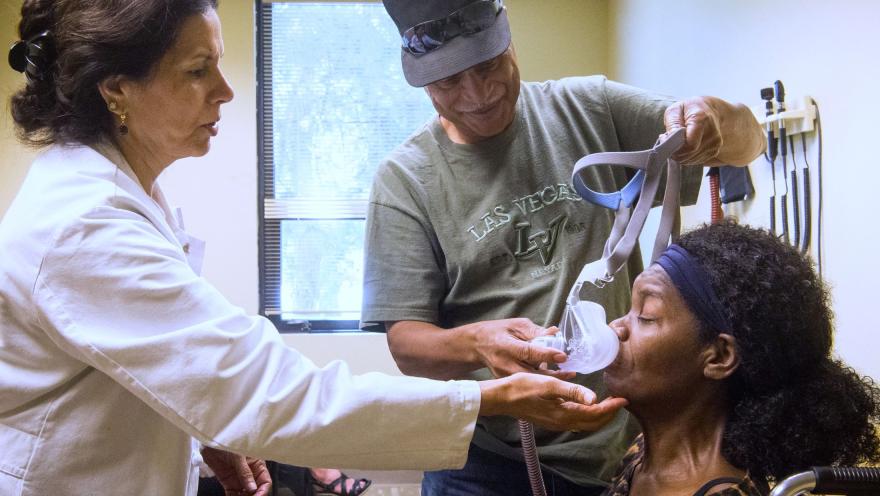An ALS diagnosis often leaves people feeling overwhelmed and uncertain about their future. Among the many challenges they face, uncertainty about insurance coverage for treatments and equipment they need to live shouldn’t be one of them. And with the help of ALS advocates nationwide, we’re working to make sure people with ALS and their families have access to what they deserve.
To help educate the public and raise awareness of the growing issues people with ALS and their families struggle with, ALS Association CEO Calaneet Balas recently shared her views about insurance denials in an op-ed published by the International Business Times, specifically relating to the use of ventilators and assistive technology.
In her piece, Balas talks about how patients with Medicare Advantage plans in particular often find themselves being denied the critical equipment and technologies they need to live, specifically non-invasive ventilators (NIV).

“It's hard to imagine anything more essential to life than the ability to breathe. Yet Medicare Advantage plans are denying hundreds of claims for ventilators to patients with amyotrophic lateral sclerosis, or ALS, as not ‘medically necessary,’” said Balas.
“If a person living with ALS has traditional Medicare, they’ll almost certainly have no problem getting their claim for a ventilator covered. But if they have a privately administered Medicare Advantage plan—like nearly half of all Medicare beneficiaries—their claim will probably be denied.”
Medicare Advantage plans are administered by private, for-profit insurance companies under an agreement to provide the same benefits as traditional Medicare plans. However, this has not been the case for many ALS patients in need of costly durable medical equipment like NIVs. A recent ALS Focus survey found that one in three ALS patients with Medicare Advantage reported having a claim delayed or denied.
Despite requiring expert opinions, diagnoses and prognoses to process claims at all, many Medicare Advantage insurance companies will second-guess medical professionals’ prescriptions, pushing back to suggest lower-cost—and sometimes less effective—care options to save money. Many insurance providers even require patients to try other treatment options or equipment and “prove” that they aren’t effective before approving more expensive options, a very dangerous option for people with ALS.

We receive countless stories from the community sharing their difficult and frustrating experiences dealing with insurance companies delaying and denying their claims for care services and assistive technology.
For example, Jacob Harper was diagnosed with a rare, super-aggressive genetic version of ALS when he was just 22 years old. After being diagnosed, Jacob’s neurologist prescribed a Trilogy ventilator to improve his health and quality of life.
After all the back-and-forth, his insurance company ultimately approved his access to the equipment, but it was a different brand of ventilator than the one he was prescribed.
“With a one to three-year life expectancy, six months is an unacceptable waiting period,” Jacob said. And unfortunately, Jacob’s story is far from unique.
Whether denying claims outright or delaying approval when time is of the essence, Medicare Advantage insurance companies are putting their policyholders in danger. When their customers are at their most vulnerable, these highly profitable businesses are often putting profit before the health and safety of the very people they serve.
Tips to Help Navigate this Challenging Process
We continue to push regulators and legislators to take action on this very important issue. Until then, we have resources available and steps you can take to ensure you and your loved ones receive the support you need.

- To learn more about how to navigate the maze of health insurance and benefits when living with ALS, visit our website HERE or consider contacting The ALS Insurance and Benefits Resource Line for additional help.
- If you have an insurance claim denied, be sure to communicate with your doctor and work with them throughout the appeals process. Be sure to keep records of all your and your doctors’ communication with the insurance company.
- If your claims are denied repeatedly, please use our Guide for Denials Beyond Appeal to document and communicate violations with your State Insurance Commissioner.
- Reach out to your local Association care team; they can connect you with services, equipment loans and support groups.
“An insurer shouldn't be able to override a doctor's judgment of what's medically necessary or appropriate for a patient just to line their pockets,” Balas stated. “Regulators and legislators must insist that Medicare Advantage plans follow the law—and provide the care ALS patients and other beneficiaries are entitled to. No patient should have to fight for the right to breathe.”
To learn more about what you can do to help the ALS community navigate this and other challenges, visit our Advocacy Action Center and sign up to become an advocate today.
To continue to follow stories about people living with ALS in the community and learn more about the disease, subscribe to receive our weekly blogs in your inbox HERE or follow us at als.org/blog.


Comments
When you refer to "traditional Medicare plans" in the article are you talking about MEDIGAP Plans, like plan G, etc? Or Core Medicare, that only covers you for 80% of the overall costs?
Hi Tracey, thank you for reaching out to us with your question. Traditional Medicare is Medicare Part A and B, which only covers about 80% of billed costs. A Medigap plan, like the plan G you mentioned, would typically pick up the other 20%. To summarize, people choosing traditional Medicare will typically also purchase a Medigap plan to cover most of their medical costs. For more information about how to navigate Medicare, visit our website here: https://www.als.org/navigating-als/financial-information/medicare-infor…
Join the conversation. Please comment below.